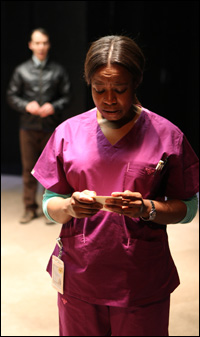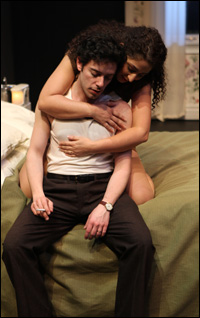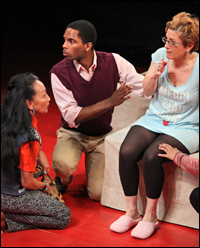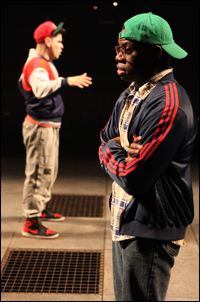
*
Ever since his success with Urinetown on Broadway, Tony-winning playwright Greg Kotis says, he has written each new play hearing two voices.
"One voice says: 'We should make this commercial.' The other voice says: 'Screw that. Do the exact opposite'"
Which voice won out in his latest play seems clear to anybody who saw Michael von Siebenburg Melts Through the Floorboards, which is about vampire cannibals. Kotis prefers to describe it as "a funny play about a 500-year-old meat-eating Austrian baron who has an existential crisis." It was one of the seven full-length plays that premiered at the 36th annual Humana Festival of New American Plays at the Actors Theatre of Louisville in recent weeks; a media and industry weekend, offering a whirlwind of works in repertory, was held March 30-April 1.
"Humana is an important festival," Kotis says. "It's an honor and a privilege to be part of it. I can't imagine a playwright turning down the opportunity." Such Broadway hits as Agnes of God, The Gin Game and Crimes of the Heart had their first productions at the Humana Festival. More recently, playwright Jordan Harrison, a regular at Humana, had a success last season at Playwrights Horizons with a show that had its premiere at the festival, Maple and Vine.
"Our mission is not to have our shows go to Broadway," says Zan Sawyer-Dailey, long-time associate director of Actors Theatre of Louisville. "Our purpose is to nurture the playwrights, and plays, of America."
Some 400 new plays have been produced as part of the festival over the past three dozen years. This surely has helped spur the local scene, which includes three other professional theatres and at least 30 other companies, "a mix of the well-established and storefront theatres without storefronts," according to Amy Attaway, a Louisville native. On staff at the Actors Theatre, Attaway directed one of the Humana productions this year, Oh, Gastronomy, a collection of 28 quick and funny skits by five playwrights, all about food, performed by this season's 22 performing members of the Actors Theatre's apprentice/intern program. Attaway is also starting a new company of her own, called 502 (the area code for Louisville).
| |
 |
|
| Quincy Tyler Bernstine and Paul Niebanck in Death Tax | ||
| photo by Alan Simons |
"It's the best opportunity of the year to get to know new writers, actors, directors and designers while at the same time communicating with colleagues in the industry," says David Muse, the artistic director of Studio Theater in Washington, DC.
"Humana is the granddaddy of new play festivals," says Jim Steinberg, whose father created the Harold and Mimi Steinberg Charitable Trust, which focuses on funding American theatre, including an annual New Play Award for plays not yet produced in New York City. "But in the last decade there has been a proliferation of such festivals from Miami to Boise, Syracuse to St. Louis."
The difference, says Muse, is "the others are really mostly play-reading festivals. Humana is unique in that it offers full productions."
One of the most talked-about of these productions at this year's festival was Death Tax by Lucas Hnath. Maxine, a dying woman in a nursing home accuses a nurse of trying to hasten her death so that Maxine's daughter would have to pay fewer taxes on the estate. Is the nurse really getting paid off? One of the strengths of the play is the audience's shifting understanding of the truth, and of the characters' motives. "People came up to me to talk about their relationship with their mother; the play seems to provoke that," says Hnath, who adds he had never even heard Death Tax spoken aloud until Humana. A strength of the production — as all of the Humana productions — is the quality of the performances. The nurse, for example, was played by Quincy Tyler Bernstine, a first-rate New York actress who was in the cast of Lynn Nottage's Ruined Off-Broadway.
| |
 |
|
| Hadi Tabbal and Rasha Zamamiri in The Hour of Feeling | ||
| Photo by Alan Simons |
Baron, a New York playwright, has had work included previously in the festival, in one season's "anthology" play (this year, the anthology play was Oh, Gastronomy!) and in the annual program of ten-minute plays. Eat Your Heart Out was her first full-length play in the festival. "This was the best professional experience of my life," she says.
The actress who played the teenager Evie, Sarah Grodsky, definitely thinks the same thing, if only by default: "This was my first job," she explains.
"But not your last," Baron adds.
A requirement for acceptance at the Humana Festival is that the play be having its world premiere. The Hour of Feeling by Mona Mansour is something of a prequel to her well-received play of last year at the Public Theater, Urge for Going, about a family living in a Palestinian refugee camp in Lebanon. That play focused on the teenager Jamila. This one goes back four decades to tell the story of her parents, Adham and Abir, their courtship, and then their trip to England to deliver a lecture on William Wordsworth (Mansour's play is threaded with the poet's words, both in English and translated into Arabic) on the eve of what turns out to be the Six-Day War.
| |
 |
|
| Ching Valdes, Calvin Smith and Lisa Kron in The Veri**on Play. | ||
| photo by Alan Simons |
"How many people have ever had a problem with their cell phone provider," her character asks the audience near the end of the 90-minute play. Nearly all at the performance I attended raised their hands.
"How many of you are going to do something about it?"
One hand.
Idris Goodwin's How We Got On, focuses on three suburban kids who aim for stardom as rappers. "That kid is going to be a star; he has the look, a deep voice, and he can act," whispered a New York casting director, pointing out Brian Quijada, who played one of the rappers. The casting director (who later approached the actor) was one of many at the "industry weekend" that compresses the February-April Humana season into three days of plays, panels and parties.
| |
 |
|
| Brian Quijada and Terrell Donnell Sledge in How We Got On. | ||
| Photo by Alan Simons |
Collins played Baron Michael von Siebenburg, who lives in a rent-controlled apartment. His nosy landlady wonders why a bevy of young women visit him, but never leave. The reason: He plies them with spiked wine, kills them and eats them. This is how the baron and his medieval pal Sammy have stayed alive over the centuries. But now in the baron's dreams arise an old comrade, Otto, and his own long-dead wife Maria, and he must contend with the changing status of women.
Kotis thinks it ridiculous that vampires traditionally only drink blood. It makes more sense that they eat meat, tenderized, with paprika.
"Who gets to define vampires?" Kotis asks. "Is it Bram Stoker? Is it some kind of Eastern European folklore? Producers of 'True Blood'? If any of them can define them, then I can too."
Kotis was happy with the treatment of his play at the Humana Festival — "it was a big sumptuous production, with steam, flashing lights and thunder! Once you know you can have such toys, you unleash them."
He hopes to take the baron elsewhere. "It's not for lack of trying that I don't write commercial shows. There's a lot of plays circulating around; it's musical chairs with only a few chairs." Humana is one of the high chairs.
*
The Humana Festival is made possible by The Humana Foundation. Visit actorstheatre.org.
(Jonathan Mandell is a New York theatre journalist and critic whose work has been seen in the pages of Playbill magazine and American Theatre. He tweets as @NewYorkTheater.)










